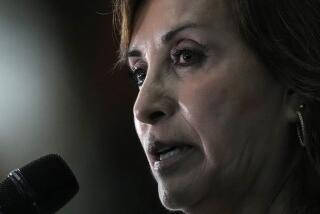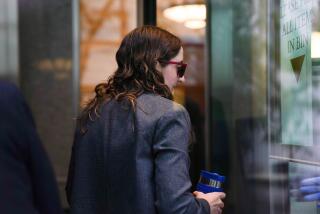Mrs. Marcos Drained Cash, Banker Says
- Share via
NEW YORK — The top officer of a bank that federal prosecutors called the “personal piggy bank” of former Philippine first lady Imelda Marcos testified Thursday that Mrs. Marcos caused such a cash drain that state regulators threatened to close the Manhattan branch.
Oscar M. Carino, former vice president and manager of the Manhattan branch of the Philippine National Bank, said that in the early 1980s his bank could not account for $22 million in funds advanced on behalf of Mrs. Marcos.
Testifying in the third day of the fraud and racketeering trial of Mrs. Marcos, Carino said he regularly sent bundles of cash to Mrs. Marcos’ hotel suite when she visited New York and transferred millions of dollars from the bank’s operating accounts on her instructions.
Some of those transfers apparently were made to finance real estate and art purchases. The bundles of cash--which totaled about $100,000 each time she visited--were used, at least in part, to finance shopping and entertainment expenses.
Prosecutors said Mrs. Marcos “cracked open” her piggy bank to satisfy her “voracious appetite” for art and jewels. Mrs. Marcos, 60, is charged with racketeering, conspiracy, mail fraud and obstruction for allegedly embezzling more than $160 million from the Philippine treasury to buy New York real estate and artworks.
Defense lawyers have argued that Mrs. Marcos’ celebrated shopping sprees were to buy gifts for Philippine officials, an appropriate use of government funds by the wife of a head of state.
Carino said he rushed to Manila to confer with the first lady about the bank examiner’s warning. The crisis at the bank, which is owned and controlled by the Philippine government, eventually passed.
Carino’s testimony undercut defense arguments that the late Philippine dictator Ferdinand E. Marcos, not his wife, was the force behind financial dealings that are at the core of federal fraud charges.
He said, for example, that Marcos tried unsuccessfully to scuttle Mrs. Marcos’s first real estate deal--the $50-million purchase of a 5th Avenue office building.
Marcos first called Carino to say the deal was canceled. But a few hours later, Marcos called back to reverse the decision.
Carino also testified that he received all of his instructions to transfer funds and deliver cash to the hotel from Mrs. Marcos or from her personal secretary.
Alfred C. Clark, a New York financial adviser who invested several million dollars on behalf of Mrs. Marcos, also testified Thursday that, although Marcos was aware of some of the investments, they were controlled by Mrs. Marcos and coded with her initials on internal accounting documents.
And in the day’s most emotional moment, the executor of the estate from which Mrs. Marcos bought millions of dollars in art and antiques choked up as he described the “pitiful” condition of the 17th- and 18th-Century artifacts when they were seized by FBI agents in 1988.
The purchase was made in the name of a Philippine export firm controlled by a close friend of Mrs. Marcos--a front, prosecutors said. In order to avoid paying about $50,000 in New York sales taxes, the buyers said the art was destined for export and resale outside the United States.
Seven years later, however, much of the art--part of what is known as “the Samuels collection”--was recovered in the California home of Irene Marcos Araneta, a daughter of Mrs. Marcos.
Morton Bernstein, the personal secretary to the late philanthropist Leslie Samuels and his wife, said he found the works in “deplorable condition,” stored in a garage and barn, covered in cobwebs, sitting on dirt.
“When one realizes how much this collection meant to the Samuels, it’s heartbreaking,” he said, his voice breaking.
More to Read
Sign up for Essential California
The most important California stories and recommendations in your inbox every morning.
You may occasionally receive promotional content from the Los Angeles Times.










